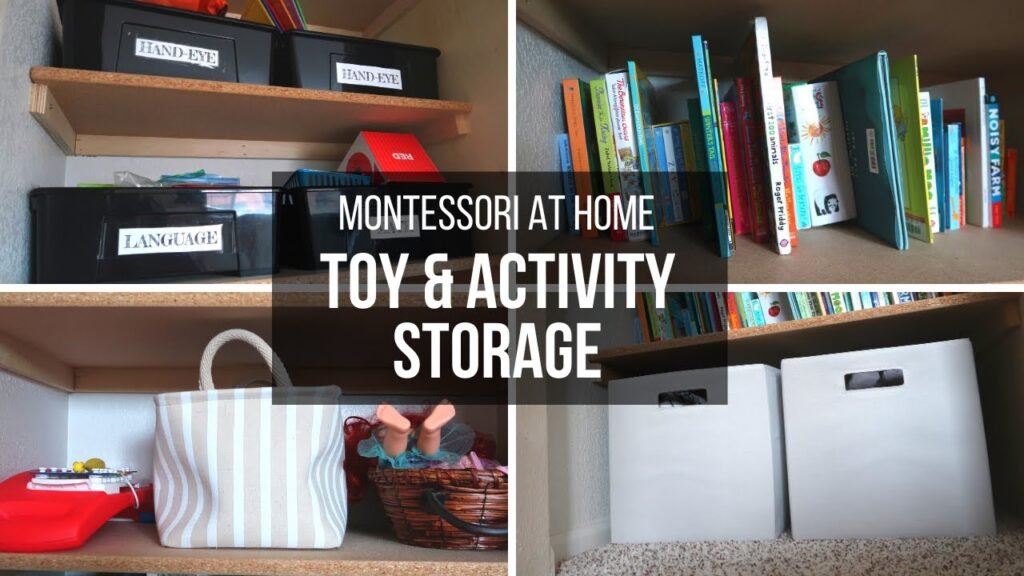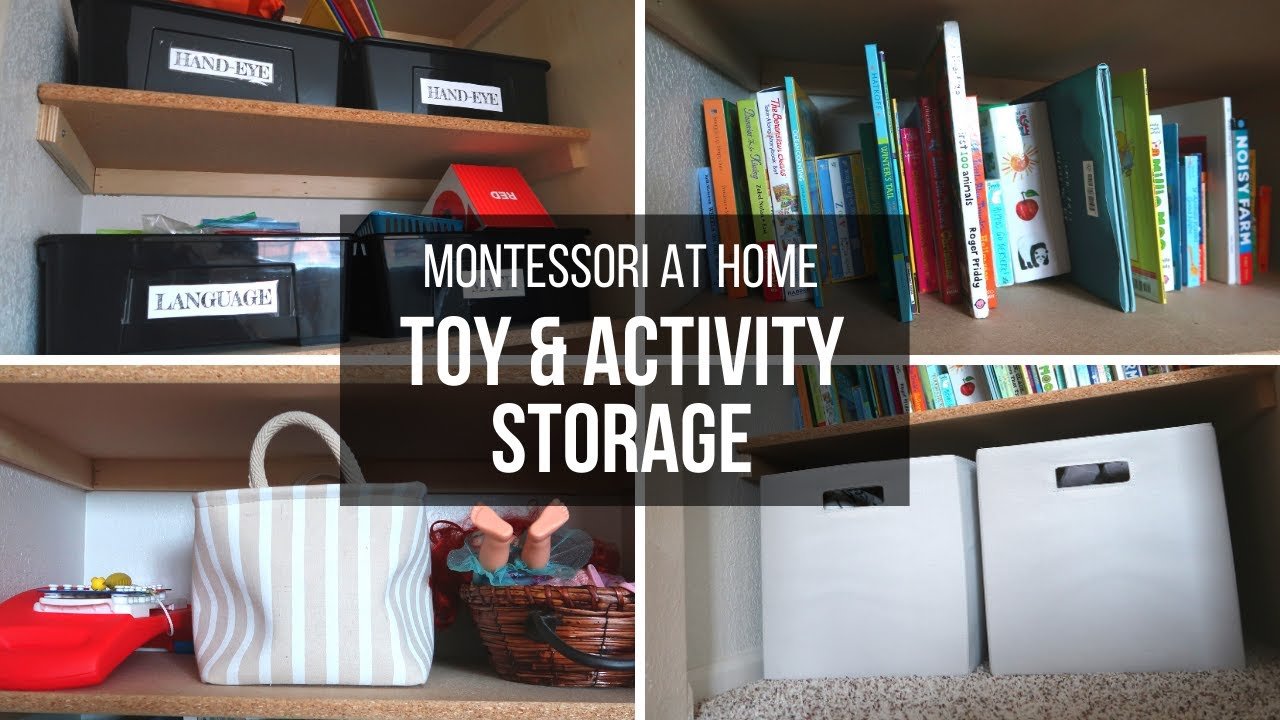Hey there, Ashley here! I’m a mom of two little girls, Kylie and Mia. In my video, I share my system for organizing and storing toys for Montessori education. The key is to limit the number of toys available to children at one time and have a rotation system.
For Kylie, I use labeled black boxes in her closet to categorize toys by type. This system helps with hand-eye coordination, language development, math skills, and sensory exploration. I also show how Mia’s toys are organized, including sensory items and DIY toys. It’s all about creating a space that promotes development and engagement for your little ones. Have fun organizing your toys for a Montessori home!
Benefits of Toy Organization for Montessori Education
Having a well-organized collection of toys is highly beneficial for Montessori education. It promotes order and organization in children, helping them understand the importance of neatness and structure in their environment. When toys are organized, children can easily find what they are looking for, fostering a sense of independence and decision-making skills.
Furthermore, toy organization encourages creativity and imagination. When toys are displayed in an organized and accessible manner, children are inspired to engage with them more creatively. They can easily explore different toys, combine them in unique ways, and come up with imaginative play scenarios. This creative freedom is essential for their cognitive and emotional development.
Toy Selection for Montessori Education
When selecting toys for Montessori education, it is crucial to choose open-ended toys that promote exploration. Open-ended toys are versatile and can be used in multiple ways, allowing children to explore and experiment with them freely. These toys encourage problem-solving skills, creativity, and critical thinking.
Opting for toys made with natural materials is also essential for Montessori education. Natural materials are eco-friendly, non-toxic, and provide a sensory-rich experience for children. They help children connect with the natural world and appreciate the beauty of nature, enhancing their overall learning experience.
Avoiding toys with batteries or electronic features is another important aspect of toy selection for Montessori education. Battery-operated toys can limit children’s creativity and imagination, as they often dictate how the toy should be played with. Choosing battery-free toys encourages children to use their imagination and develop their own play scenarios.
Storage Solutions for Montessori Toys
To maintain a well-organized toy collection for Montessori education, it is essential to use labeled boxes or bins for easy organization. Labeling boxes with categories or toy types helps children identify where each toy belongs and encourages them to put toys back in their designated place after playtime.
Rotating toys regularly is another effective strategy for maintaining interest and engagement. By rotating toys, children have access to a variety of play options without feeling overwhelmed by too many toys at once. This approach also helps keep the play environment fresh and exciting, encouraging continuous exploration and learning.
Creating dedicated spaces for each type of toy or activity is key to effective toy organization in a Montessori home. Having designated areas for puzzles, art supplies, building blocks, and other toy categories helps children develop an understanding of where each toy should be stored and promotes a sense of order in the play environment.

Organizing Toys by Category
Categorizing toys by type, such as puzzles, art supplies, and building blocks, makes it easier for children to find and choose toys for play. Labeling shelves or containers with clear categories helps children identify where each toy belongs and contributes to a sense of order and organization.
Involving children in the organization process is also beneficial for teaching responsibility and ownership. When children participate in organizing their toys, they learn valuable life skills such as tidiness, decision-making, and teamwork. This collaborative approach instills a sense of pride and ownership in children, making them more likely to take care of their toys and play spaces.
DIY Toy Ideas for Montessori Education
Creating DIY toys for Montessori education can be a fun and rewarding activity for both children and parents. Sensory bins with different textures and materials are excellent DIY toys that promote sensory exploration and tactile learning. Children can engage in hands-on activities that stimulate their senses and encourage curiosity.
Homemade puzzles and matching games are another great DIY toy idea for Montessori education. These activities help children develop problem-solving skills, memory, and concentration. By creating their own puzzles and games, children can personalize their learning experiences and engage in meaningful play.
Exploring nature-based art projects and activities is also a wonderful DIY toy idea for Montessori education. Nature provides endless inspiration for creative projects, such as leaf rubbings, rock painting, and pressed flower crafts. Engaging with nature-based toys and activities fosters a deep connection to the natural world and encourages environmental stewardship.
Tips for Implementing Montessori Philosophy at Home
Implementing Montessori philosophy at home involves several key principles that support children’s learning and development. Limiting the number of toys available at a given time is essential for promoting focus, creativity, and independent play. When children have fewer toys to choose from, they are encouraged to explore their surroundings more deeply and engage with toys in meaningful ways.
Encouraging child-led play and exploration is another important aspect of Montessori philosophy. Allowing children to follow their interests, make choices, and discover their passions fosters independence, confidence, and self-motivation. Child-led play enables children to take ownership of their learning experiences and develop a sense of agency in their play.
Providing a mix of individual and group activities is also crucial for social development in Montessori education. Balancing independent play with collaborative activities helps children build social skills, empathy, and cooperation. Group activities promote teamwork, communication, and problem-solving, while individual activities foster autonomy, creativity, and self-expression.
Maintaining Toy Organization Over Time
Maintaining toy organization over time requires regular decluttering and organization to keep the play environment neat and engaging. Children’s interests and preferences change as they grow, so it is essential to declutter and donate toys that are no longer used or appreciated. This process helps create space for new toys and activities that align with children’s current interests.
Adjusting storage systems as children grow and interests evolve is another important aspect of maintaining toy organization. As children develop new skills and interests, their toy collection may need to be reorganized to accommodate these changes. By adapting storage systems to meet children’s evolving needs, parents can ensure that toys remain accessible, engaging, and educational.
Seeking feedback from children on what toys they enjoy and value most is a valuable strategy for maintaining toy organization. Children’s preferences and interests should be taken into account when organizing toys and play spaces. By listening to children’s feedback and observing their play patterns, parents can create a stimulating and enriching play environment that supports children’s development and creativity.
Incorporating Montessori Principles into Everyday Play
Incorporating Montessori principles into everyday play is essential for creating a supportive and enriching learning environment for children. Focusing on activities that promote concentration and focus helps children develop attention span, mindfulness, and cognitive skills. By engaging in activities that require sustained attention, children learn how to concentrate and stay focused on tasks.
Encouraging practical life skills through play, such as cooking and cleaning, is another key aspect of Montessori education. Practical life activities help children develop independence, problem-solving skills, and fine motor skills. By engaging in hands-on tasks that mimic real-world activities, children learn valuable life skills and gain confidence in their abilities.
Creating a calm and inviting play environment is crucial for promoting a sense of peace and tranquility in children’s play. By designing play spaces that are free of clutter, distractions, and excessive stimulation, parents can create a peaceful atmosphere that supports children’s concentration, creativity, and emotional well-being.
Resources for Montessori Toy Organization
For parents seeking inspiration and guidance on Montessori toy organization, there are various resources available to explore. Watching videos like the one by Hapa Family on toy organization can provide visual inspiration and practical tips for organizing toys at home. Following @hapafamilyvlog on Instagram can also offer more insights, ideas, and inspiration for Montessori toy organization.
Additionally, exploring recommended reading materials on Montessori philosophy and education can deepen parents’ understanding of the principles behind Montessori education. Books, articles, and online resources on Montessori theory, practice, and toy organization can provide valuable insights and strategies for creating a stimulating and enriching play environment for children.
Conclusion
In conclusion, toy organization plays a vital role in Montessori education, promoting order, independence, and creativity in children’s play. By implementing simple storage solutions, involving children in the organization process, and selecting appropriate toys, parents can create a stimulating and engaging environment for learning and development. Montessori philosophy emphasizes the importance of organization, exploration, and creativity in children’s play, and by incorporating these principles into everyday activities, parents can support children’s growth, learning, and well-being.

